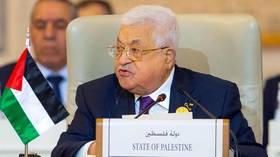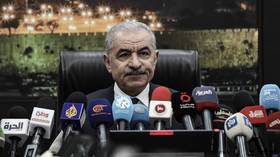Palestinian president appoints new government

Palestinian Authority President Mahmoud Abbas announced the formation of a new government on Thursday, with his premier stating that he intends for the PA to assume “responsibility for Gaza” when the Israel-Hamas war ends.
Abbas, who has led the PA since 2005, revealed his new cabinet in a presidential decree. The 88-year-old tapped his former adviser, Mohammed Mustafa, to serve as prime minister, and revealed that the cabinet will include three women and six officials from Gaza.
Mustafa, a US-educated economist, replaces Mohammad Shtayyeh, who resigned along with his entire cabinet last month. Shtayyeh said he stepped down due to “political, security, and economic developments related to the aggression against Palestinian people in the Gaza Strip, and the unprecedented escalation” against PA-governed territory in the West Bank.
Mustafa has said that his “top national priority” will be to end the war in Gaza, before “formulating visions to reunify the institutions, including assuming responsibility for Gaza,” AFP has reported.
Based in the city of Ramallah, the Palestinian Authority exercises civilian control over around 40% of the West Bank, while the rest of the territory is under full Israeli military and civilian control. The PA is composed mostly of political parties under the umbrella of the Palestine Liberation Organization, and is dominated by Abbas’ Fatah faction.
Gaza, however, has been under the control of Hamas since 2007, when the militant group won a brief and bloody armed conflict with Fatah. Hamas views the PA as illegitimate over its recognition of and negotiation with Israel.
US President Joe Biden has argued that post-war Gaza should be governed by a “revitalized Palestinian Authority.” After a meeting with Abbas in January, US Secretary of State Antony Blinken told reporters that Washington wants a reformed PA to “effectively take responsibility for Gaza” when the fighting stops.
However, Israeli Prime Minister Benjamin Netanyahu has shot down the plan, insisting on “full Israeli security control” over the enclave for the foreseeable future. Furthermore, the PA has little popular support among Palestinians due to Abbas’ refusal to hold elections, his willingness to allow Israeli troops to operate at will in the West Bank, and his failure to stop the spread of illegal Israeli settlements in the territory.













